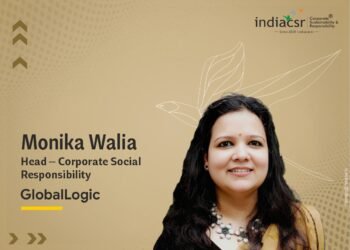STL’s four CSR focus areas viz. Women Empowerment, Education, Healthcare, and Environment Conservation have been chosen based on their intrinsic linkage to and enabling impact on other development fronts. For India CSR Leadership Series Akanksha Sharma, Head CSR and Sustainability, STL talked about STL sustainable development and sustainability programs. She says, “Sustainability needs to be looked at from an all-inclusive perspective”. Excerpts of an interview:
What are the kinds of various CSR initiatives that STL is involved in?
We have aligned our CSR focus areas with the United Nations’ Sustainable Development Goals (SDGs) and the national agenda for development. Our initiatives are essentially concentred around four focus areas – Women Empowerment, Quality Education, Accessible Healthcare, and Environment Preservation.
To deliver on such ambitious targets, we believe that it’s not enough to treat the issues on their veneer but develop deep-rooted engagements capable of addressing the root cause of the persisting issues through a multi-stakeholder approach.
Women empowerment
Intending to reduce the gender gap, we have established a holistic program focussing on the overall development of women of all ages. Through a comprehensive approach that incorporates personality development, vocational training, mobilization through self-help groups, and livelihood opportunities, the Jeewan Jyoti Women Empowerment program has impacted over 11,000 lives across 100 villages in Bhor, Velhe and Haveli talukas in Pune. Today, these women are capable of assuming responsibility for the change that they would like to see in their communities and drive it together with the Jeewan Jyoti programme.
Education
Through our ed-tech and digital empowerment initiatives like Virtual Classrooms, Pragyan, and the Digital Empowerment buses we have leveraged technology to bridge some significant gaps in terms of quality education and digital literacy reaching the masses at the bottom of the pyramid as well as building faculty capabilities. This has helped over 810,000 students understand concepts and languages better, spurring in them an urge for higher learning and self-confidence among other aspects.
Healthcare
Through our healthcare interventions such as the Mobile Medical Unit, we have been providing quality healthcare to tribal communities that do not have access to even basic health facilities. STL’s CSR projects in health have been the longest-running initiatives, and they have provided relief and respite to more than 418,000 people residing in some of the country’s remotest corners.
Environment
With our programmes like the Green Belt, Gram Samrudhi, and Jaldoot, we have been able to conserve over 785,000 cubic meters of water and maintain more than 10,000 trees while improving the livelihoods of the locals by encouraging improvisation and optimum usage of water. On the other hand, afforestation is helping in providing a cleaner environment by gradually offsetting the ill effects of the extensive industrialisation in the region.
Volunteering
Our employees are our transformation enablers. They have helped benefit over 9500 lives by volunteering more than 7000 hours through several one-offs and annual volunteering programmes.
Can you highlight any special initiative/s that STL has undertaken during the COVID-19?
The COVID-19 situation, apart from being an existential crisis, is a test of our resolve to flourish in the face of unprecedented odds. Possessing extensive networks and technical know-how, STL realised that while alleviating the present situation, it is equally essential to future-proof our business and community outreach programmes against such eventualities. At the same time, we worked with our social impact partners to transition our regular CSR programmes to digital platforms ensuring women empowerment, healthcare, digital literacy, and environmental conservation continue despite the pandemic and accompanying lockdown ultimately impacting over 300,000 lives.
We believe it is crucial to ensure continuity of these along with the necessary relief and rescue work to build a more resilient community response to contingencies like this in the future.
Additionally, through collaborations with governments, academic institutions, and local authorities, we leveraged business capabilities as well to mitigate the effects of the pandemic. We donated over 94 MT of sodium hypochlorite at Aurangabad to be used for disinfecting public places. Our STL Academy team formed Project Savdhaan through which over 15,000 youth in addition to our relief work beneficiaries were made aware of the preventive measures to be adopted to stay safe during the pandemic. We further went on to leverage this video through our mentoring and women empowerment programmes to reach youth and women across the country.
What are the kind of different causes your company supports?
STL’s four CSR focus areas viz. Women Empowerment, Education, Healthcare, and Environment Conservation have been chosen based on their intrinsic linkage to and enabling impact on other development fronts. They are not only aligned with India’s development priorities but also the UN Sustainable Development Goals.
Under Sustainability, Zero Waste to Landfill is one of the fundamental ways we drive responsible operations. We even became the world’s first integrated optic fibre and cable manufacturer to become ‘Zero Waste to Landfill’ certified for our operations in India. To date, we have diverted over 64,000 MT of waste away from landfills. However, energy conservation, reduction of carbon emission, water positivity, sustainable sourcing, and life cycle assessments are some of the other areas we are committed to. We believe that each of these is equally important and needs to be driven in tandem to address one of the most pertinent issues of our time; ‘climate change’.
Lastly and most importantly, we focus on strict adherence to the 10 principles of the UN Global Compact Network around Human Rights, Labour Practises, Fair Wages, and Anti-Corruption. Each of these form an indispensable part of our Code of Conduct which is part of every partner contract and something even our employees need to conform to.
Can you elaborate on your recent partnership with the World Bank? How is relevant for society in current times?
Our partnership with World Bank’s 2030 Water Resources Group will work towards identifying innovative and tech-driven solutions to conserve water resources and promote water security.
Water security and scarcity are issues that our country has been increasingly facing. The rising demand for the world’s water resources for domestic, industrial, and agrarian use has been adding to the already existing water predicament throughout the country.
According to the CWMI report, by 2030, India’s water demand is estimated to be double the available supply, inferring severe water scarcity for millions of people and an eventual six percent loss in the country’s GDP. Additionally, the water conservation approaches used today are not sufficient. In years where there are droughts, water conservation or harvesting structures are practically redundant. Therefore water security is crucial and not just conservation.
Together with World Bank, we aim to address the water crisis by designing and working on programs that include; exploring unique approaches for applications of appropriately treated wastewater for groundwater recharge, conserving water where it becomes the community’s imperative and need to ensure sustainability, enabling access to clean and safe drinking water, applying treated water for afforestation and sensitizing stakeholders through community engagement programs
According to you, why is sustainability a serious business agenda for companies? Will the essence of sustainability increase for companies in the post COVID era?
The COVID-19 pandemic is a grim reminder that climate change and linked environmental risks like unstable weather patterns and the changing nature of pathogens can no longer be overlooked. Such threats, together with other anomalies like growing emissions and ever-escalating levels of plastic waste are going to be formidable challenges to human-kind. The phase is appropriate for implementing a major shift from the present linear model of myopic exploitation of limited resources to a climate-neutral circular economy that seeks to augment the use of natural resources and diminish our ecological footprint through the interlocking of industrial interests.
However, an attempt to build back better in the post-COVID-19 world will implicate a central reset in our industrial progressions, financial systems, our approach to nature, and our socio-economic and cultural associations. As we emerge from COVID-19 our missions to drive business income and universal growth need to be dictated by the doctrines of the triple bottom line and the goals in the UN sustainable development agenda, with the planet, people, and profit at its core.
I believe that the approaches for attaining financial interdependence and circularity will be based on concentrated community action, collaboration, ecological awareness, indoctrinating keen institutional consciousness towards sustainability, innovation and an unyielding mechanism to incessantly improve on ambiguities across the value chain to live up to the principles of sustainable business practices.
What initiatives Indian companies should take towards building green manufacturing units? What support do you think the government should give here?
Firstly, sustainability needs to be looked at from an all-inclusive perspective; one that encompasses the environmental, social, governance, and economic parameters. It is about creating shared value for every stakeholder and not simply about green manufacturing.
Considering the magnitude of the world’s social, environmental, and governance issues, no one corporate or institution can facilitate the transformation needed to bring about a meaningful change. We believe sustainability and business profitability are synonymous with each other and we need to ensure that our business partners are equally invested in creating a sustainable future. Collaboration is key to driving the sustainability agenda as it cannot be just about your operations. It has to be actioned across the entire ecosystem.
On the ecological front, system-wide approaches through technology and social investments that will reduce one’s environmental footprint with measured economic returns, in the long run, need to be implemented. Here the government’s help on prioritizing renewable energy along with tax reforms will help tremendously to promote green energy.
From a sustainable development viewpoint, collective action through a holistic strategy that is deeply rooted in an organization’s culture and values is crucial. Opportunities across the value chain need to be proactively identified. Innovation and leadership involvement is pivotal to achieving this and it’s the need of the hour with climate change and water scarcity being not just local or national issues, but global.






















